#花结/flower knot
Explore tagged Tumblr posts
Text
Happy gushiwensday shabbes, we have for you a delightful little jewelry box of a poem by Li He, titled "At Su Xiaoxiao's Grave."
pale orchids' honeydew, dripping like tears; the true lovers' knot is not woven for her, but the flowers by her grave defy shears--- grass for her mattress, pine needles to cover her; wind-skirted, belt jewelled with droplets of water. the bright-lacquered palanquin's waiting at dusk for her, cold bluegreen foxfire to light her way home. under westhill she sleeps now, safe from tempest and storm.
Notes and original text under the cut!
苏小小墓
幽兰露,如啼眼。 无物结同心,烟花不堪剪。 草如茵,松如盖。 风为裳,水为佩。 油壁车,夕相待。 冷翠烛,劳光彩。 西陵下,风吹雨。
Su Xiaoxiao was a famous courtesan and writer in the Qi Dynasty, a couple hundred years previous to this poem being composed. Her tomb is at the border of Jiaxing and Hangzhou. We're not sure what's up with this poetic form! Never seen anything like it before. I find the single five-syllable-line couplet enchanting.
pale orchids --- interesting word choice here! The orchids are 幽 remote or serene, although the word also has a connotation of ghosts or the underworld. I've chosen pale as a word that's associated with both stillness and a corpselike complexion.
true lovers' knot --- according to Gushiwen, 结同心 is a symmetrical knot woven from flowers that symbolizes the steadfastness of love; similar concepts exist in Europe. My interpretation is that she doesn't get one because she never married or anything similar; she died at age 19, so the tone of this might be a little sad.
the flowers by her grave --- referred to as fireworks for their bright colors, which is a bit of a joyful contrast to the first part of this line! They're bright, they're loud, they may ward off demons, and they CANNOT be cut.
to light her way --- an interesting one! As far as I can tell the literal 劳光彩 is something like "working hard to shine brilliantly."
under westhill --- I have no particular reason for not rendering this as Xiling, which is the name of the area around Xiling Bridge in Hangzhou, except that I don't think the emphasis pattern works with these tones.
safe from tempest and storm --- literally 风吹雨 wind blowing and rain; "safe" is editorializing and to make it fit the meter. I might have liked to use the more neutral "while storms blow overhead" but I'm not satisfied with the way it sounds, and home/storm is a nice slant rhyme.
7 notes
·
View notes
Photo
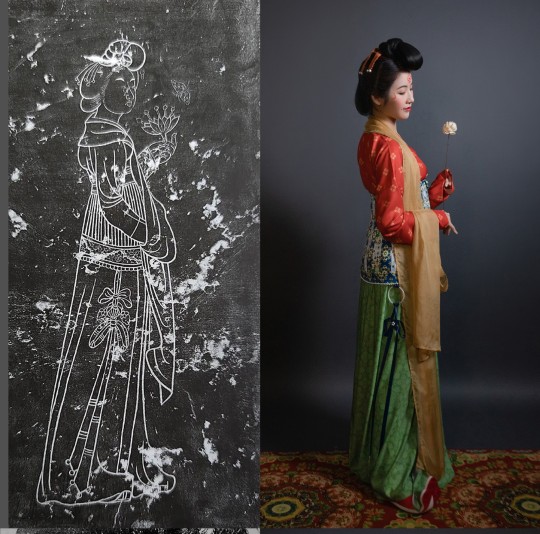
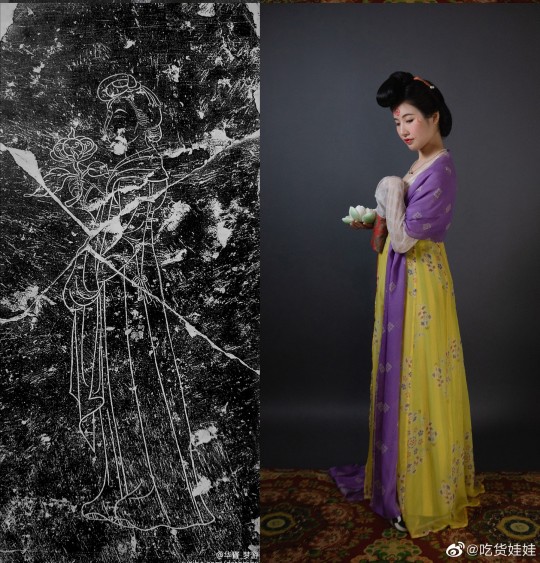
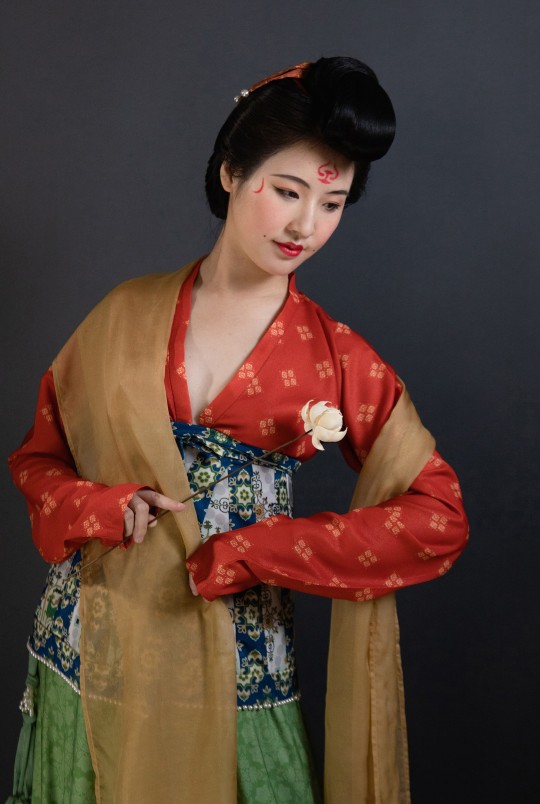
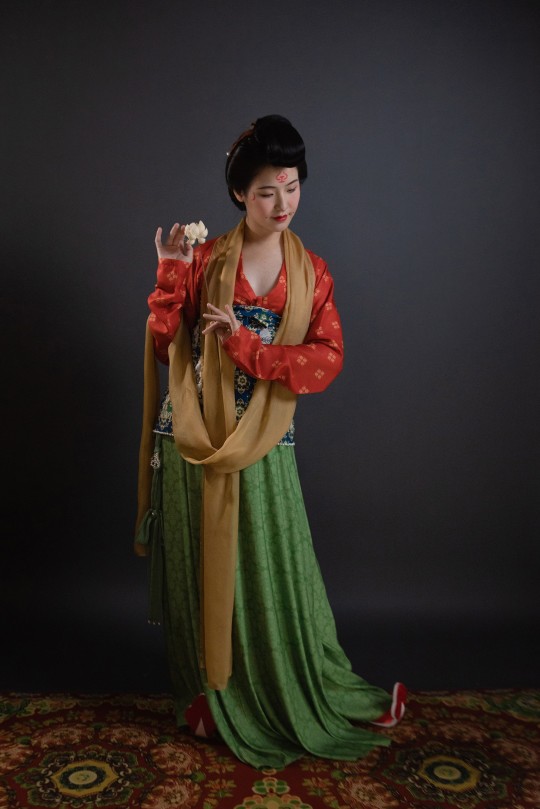
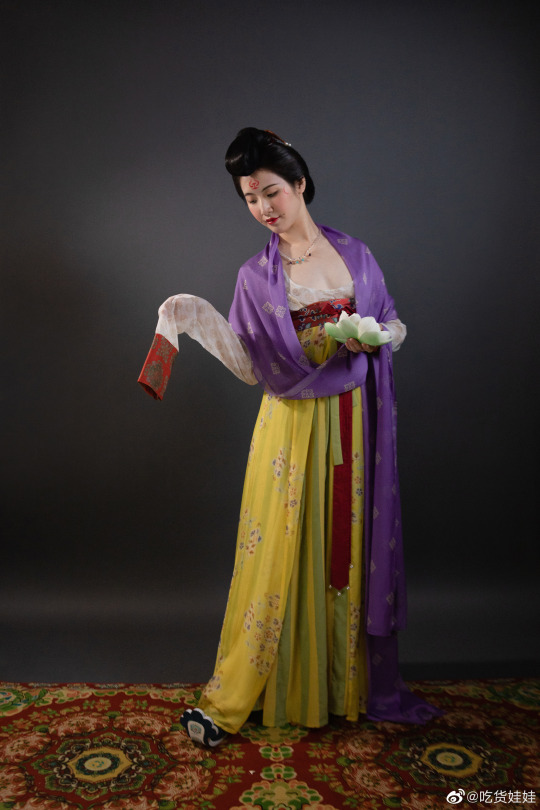
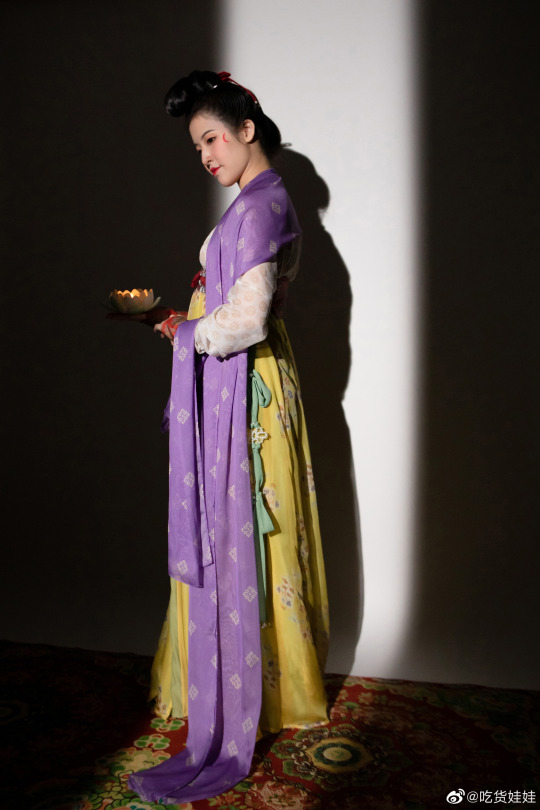
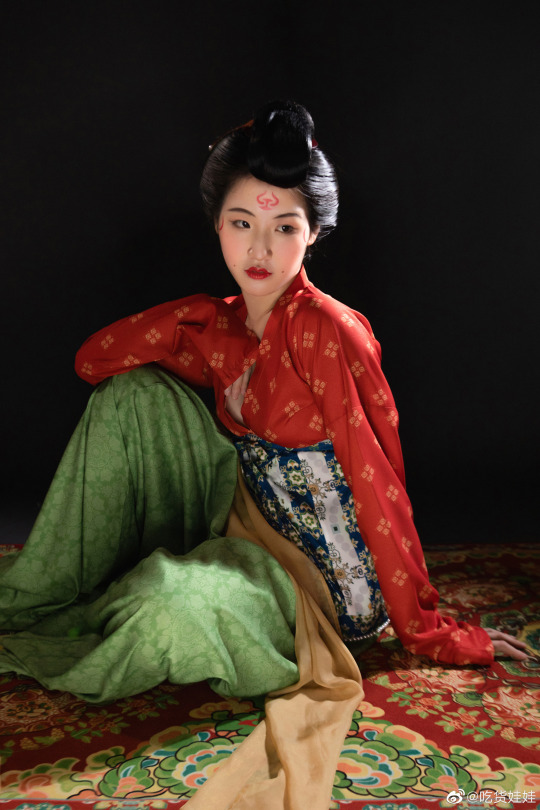
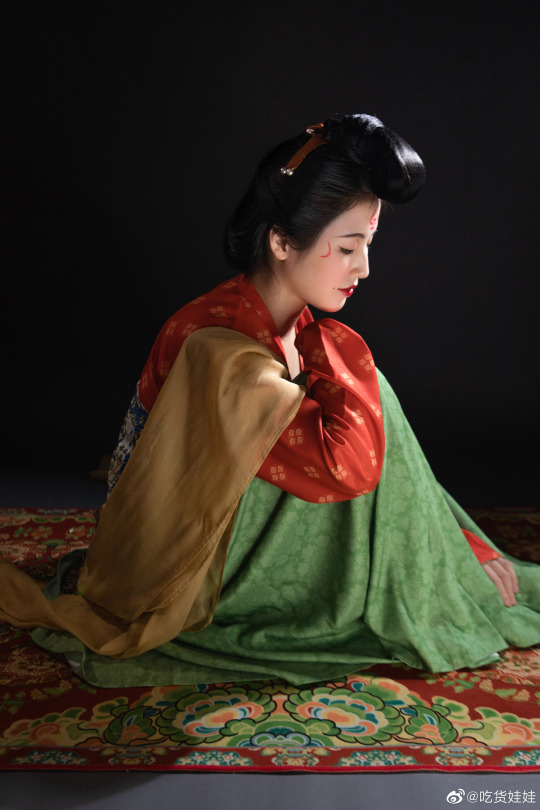
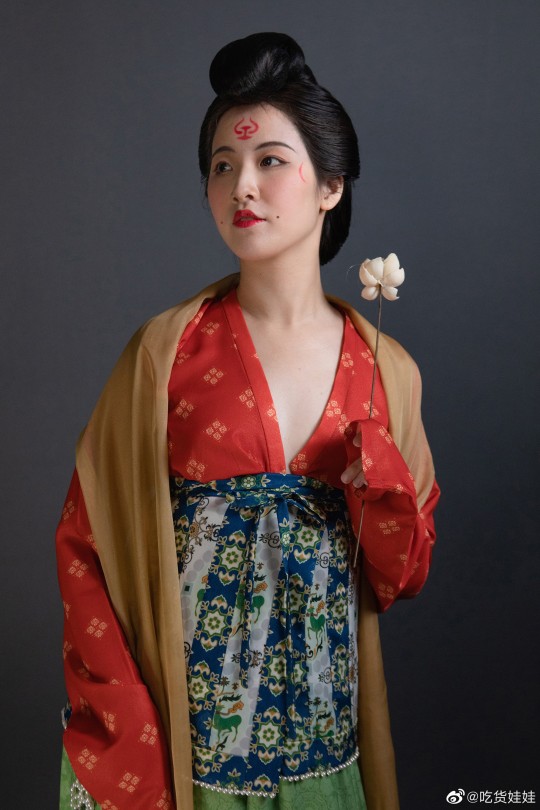
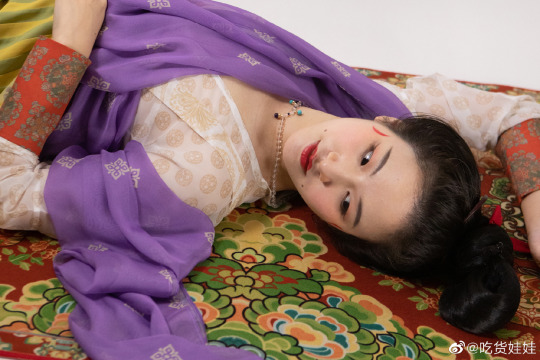
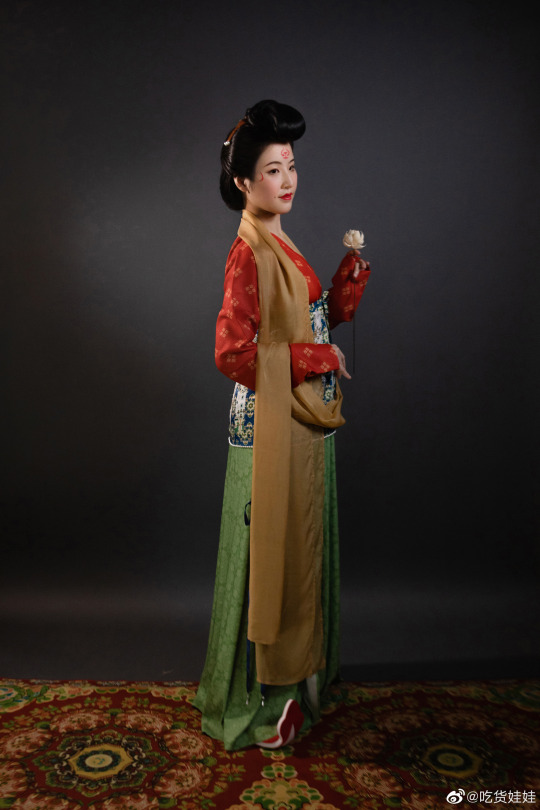
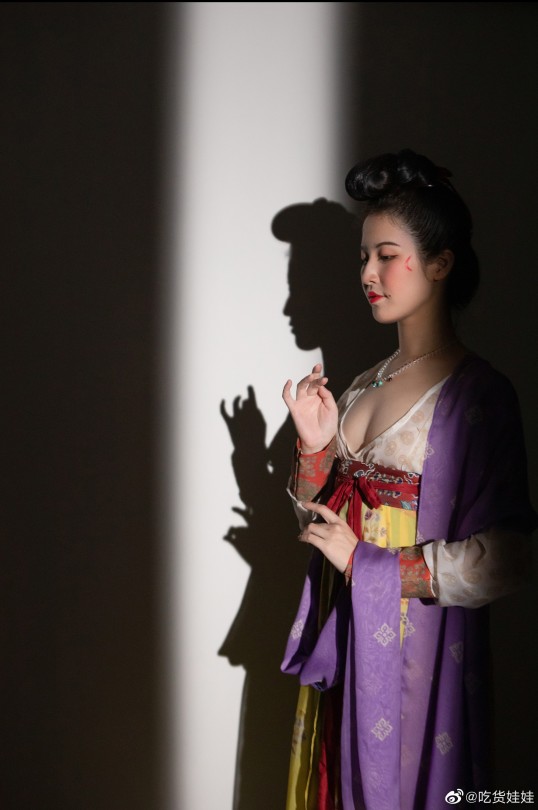
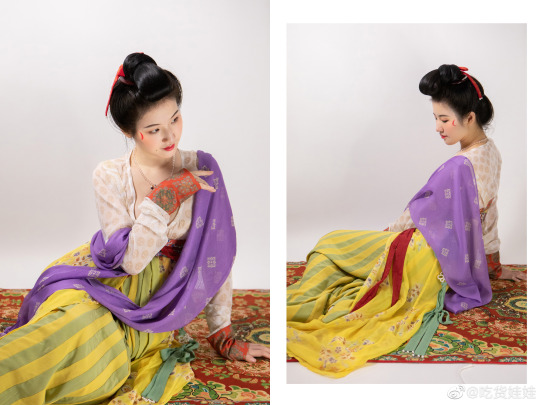
【Historical Reference Artifacts】:
Stone Carving from The Tomb of Xue Jing薛儆 (Emperor Ruizong's son-in-law) & Tang Dynasty Female Figurines:
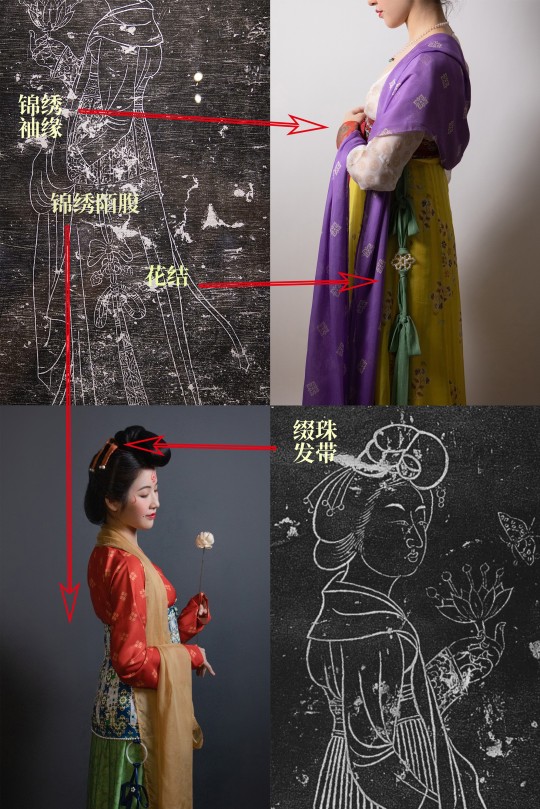
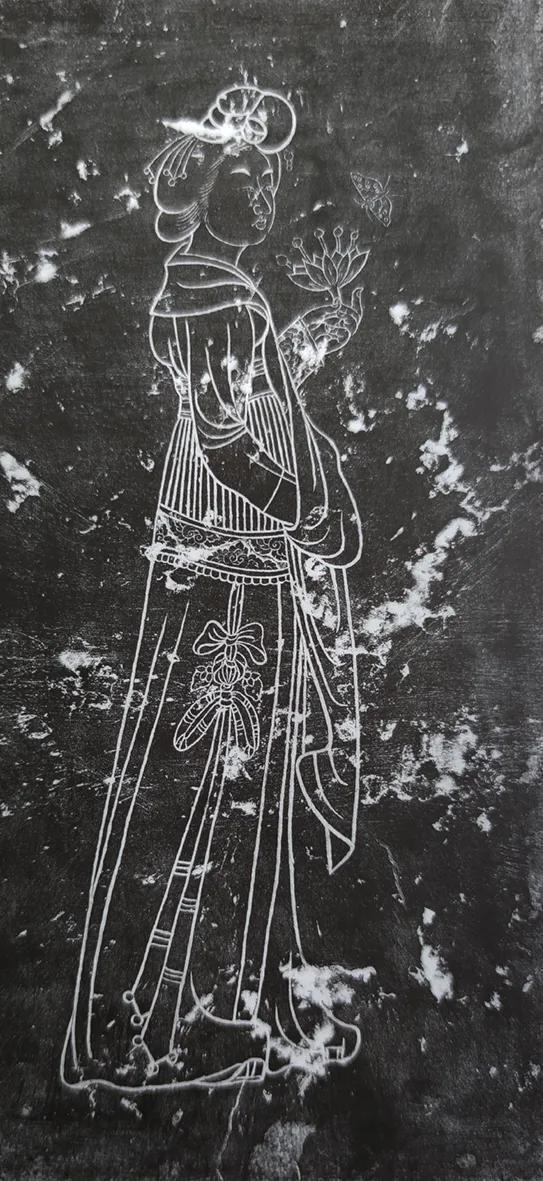
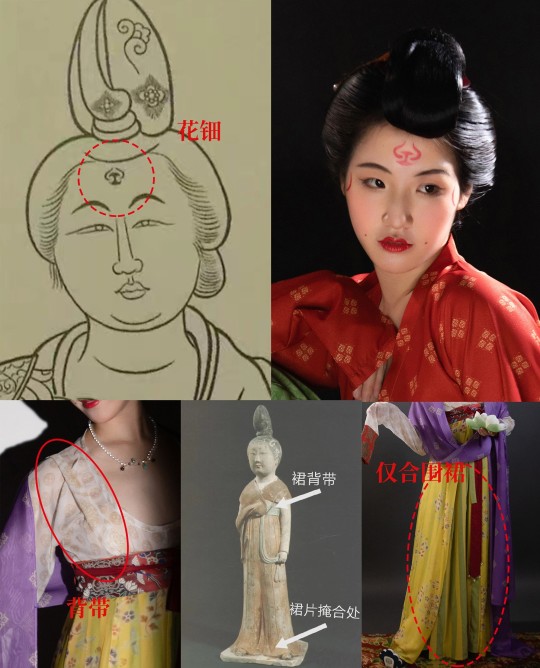
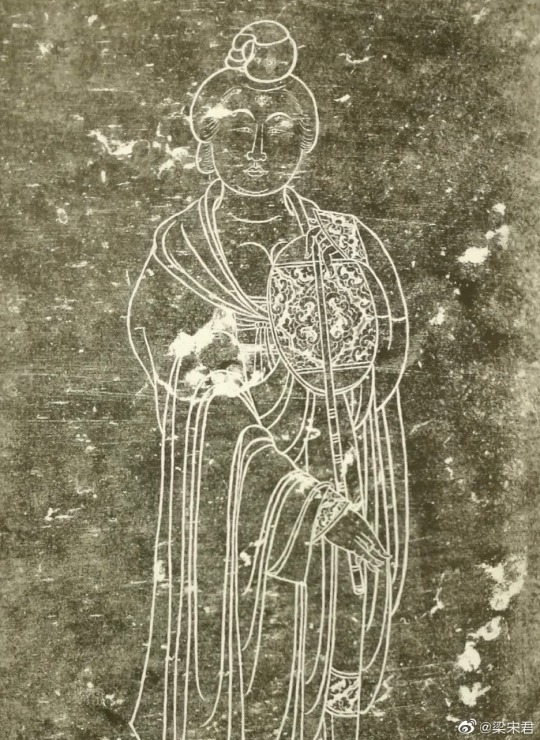
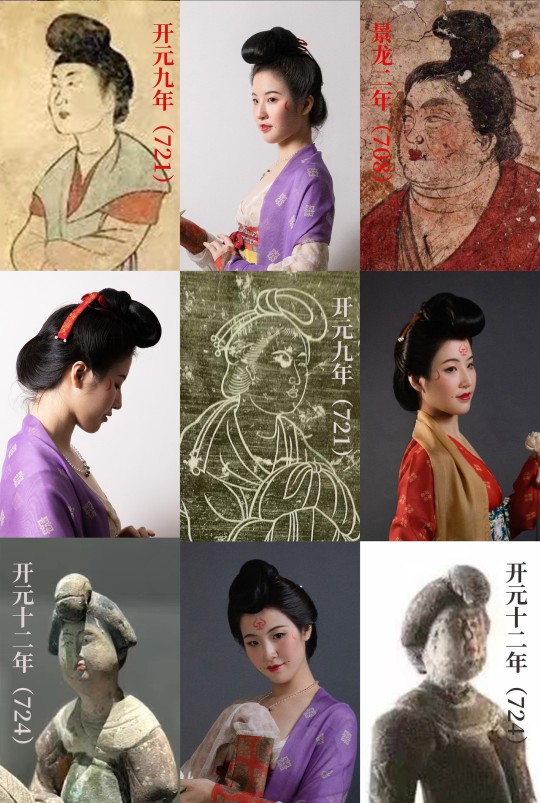
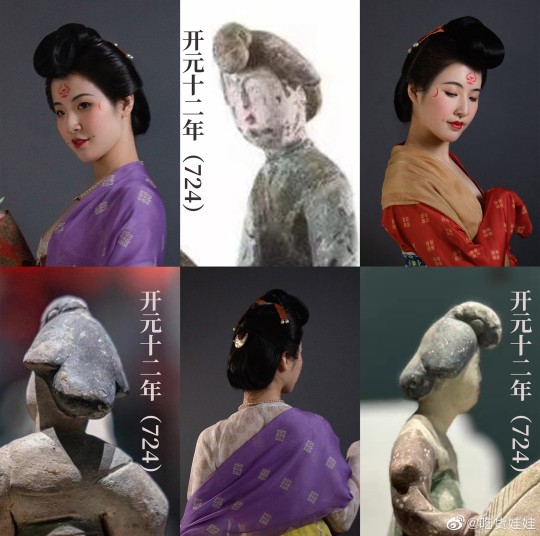
[Hanfu · 漢服]China Tang Dynasty (960–1127 AD) Chinese Traditional Clothing Hanfu & Hairstyle Based on Tang Dynasty Relics【沉寂千年的光阴】
Around the beginning of Kaiyuan period (708-724 AD) woman fashion & hairstyle
_______
Recreation Work :@吃货娃娃
🔗Weibo:https://weibo.com/1868003212/Mj46arcP9
_______
#Chinese Hanfu#Tang Dynasty (960–1127 AD)#beginning of Kaiyuan period (708-724 AD)#The Tomb of Xue Jing薛儆 (Emperor Ruizong's son-in-law)#锦绣袖缘#锦绣陌腹mofu#Huadian/花钿#裙背带#裙片掩合处#合围#背带#花结/flower knot#chinese traditional clothing#chinese historical fashion#Chinese Costume#chinese history#chinese archaeology#chinese culture relics#chinese art#Chinese Aesthetics#china#吃货娃娃#沉寂千年的光阴#hanfu#hanfu historical relic#hanfu history#漢服#汉服
226 notes
·
View notes
Text
Mandarin vocabulary
Nouns
帐户 (zhànghù) – account
酸 (suān) – acid
演员 (yǎnyuán) – actor
广告 (guǎnggào) – advertisement
农业 (nóngyè) – agriculture
愤怒 (fènnù) – anger
踝 (huái) – ankle
回答 (huídá) – answer
弓 (gong) – arch
袖子 (xiùzi) – arm
腋窝 (yèwō) – armpit
脊椎骨 (jǐchuígǔ) – backbone
香蕉 (xiāngjiāo) – banana
胡须 (húxū) – beard
床(chuáng) – bed
水泡 (shuǐpào) – blister
血液 (xiěyè) – blood
腹部 (fùbù) – belly
书 (shū) – book
男孩子 (nánháizi) – boy
脑 (nǎo) – brain
新娘 (xīnniáng) – bride
小昆虫 (xiǎokūnchóng) – bug
黄油 (huángyóu) – butter
洋白菜 (yángbáicài) – cabbage
小牛 (xiǎoniú) – calf
骆驼 (luòtuó) – camel
便帽 (biànmào) – cap
地毯 (dìtǎn) – carpet
胡萝卜 (húluóbo) – carrot
椅子 (yǐzi) – chair
变色蜥蜴 (biànsè xīyì) – chameleon
面颊 (miànjiá) – cheek
胸腔 (xiōngqiāng) – chest
公民 (gōngmín) – citizen
煤 (méi) – coal
海岸 (hǎi’àn) – coast
硬币 (yìngbì) – coin
颜色 (yánsè) – color
角 (jiǎo) – corner
懦夫 (nuòfū) – coward
母牛 (mǔniú) – cow
罪行 (zuìxíng) – crime
庄稼 (zhuāngjià) – crop
乌鸦 (wūyā) – crow
王冠 (wángguàn) – crown
保护 (bǎohù) – custody
舞蹈 (wǔdǎo) – dance
危险 (wéixiǎn) – danger
日期 (rìqí) – date
天 (tiān) – day
死亡 (sǐwáng) – death
装饰 (zhuāngshì) – decoration
鹿 (lù) – deer
部 (bù) – department
沙漠 (shāmò) – desert
狗 (gǒu) – dog
门 (mén) – door
疑问 (yíwèn) – doubt
十二个 (shí’èrgè) – dozen
梦 (mèng) – dream
衣服 (yīfú) – dress
饮料 (yǐnliào) – drink
落下 (luòxià) – drop
鸭 (yā) – duck
尘土 (chéntǔ) – dust
鹰 (yīng) – eagle
耳朵 (ěrduǒ) – ear
地球 (dìqiú) – Earth
东边 (dōngbian) – east
回声 (huíshēng) – echo
经济 (jīngjì) – economy
编辑 (biānjí) – editor
教育 (jiàoyù) – education
日食 (rìshí)– eclipse
肘 (zhǒu) – elbow
末端 (mòduān) – end
能量 (néngliàng) – energy
环境 (huánjìng) – environment
事件 (shìjiàn) – event
眼睛 (yǎnjīng) – eye
眼毛 (yǎnmáo) – eyebrow
面孔 (miànkǒng) – face
公平的 (gōngpíngde) – fair
扇 (shàn) – fan
农场 (nóngchǎng) – farm
父辛 (fùxīn) – father
火 (huǒ) – fire
手指 (shǒuzhǐ) – finger
鱼 (yú) – fish
旗 (qí) – flag
火焰 (huǒyàn) – flame
肉 (ròu) – flesh
飞 (fēi) – fly
地板 (dìbǎn) – floor
面粉 (miànfěn) – flour
花 (huā) – flower
花盆 (huāpén) – flower pot
长笛 (chángdí) – flute
泡沫 (pàomò) – foam
雾 (wù) – fog
脚 (jiǎo) – foot
额 (é) – forehead
堡 (bǎo) – fort
喷出 (pēnchū) – fountain
青蛙 (qīngwā) – frog
燃料 (ránliào) – fuel
作用 (zuòyòng) – function
将来 (jiānglái) – future
赌博 (dǔbó) – gamble
垃圾桶 (lèsètǒng) – garbage
花园 (huāyuán) – garden
女孩子 (nǚháizi) – girl
玻璃 (bōlí) – glass
手套 (shǒutào) – glove
胶 (jiāo) – glue
山羊 (shānyáng) – goat
上帝 (shàngdì) – God
金 (jīn) – gold
祖父 (zǔfù) – grandfather
祖母 (zǔmǔ) – grandmother
葡萄 (pútáo) – grape
坟墓 (fénmù) – grave
卫队 (wèiduì) – guard
客人 (kèrén) – guest
树胶 (shùjiāo) – gum
习惯 (xíguàn) – habit
头发 (tóufǎ) – hair
手 (shǒu) – hand
锤 (chuí) – hammer
危险 (wéixiǎn) – hazard
头 (tóu) – head
堆 (duī) – heap
心 (xīn) – heart
热 (rè) – heat
脚后跟 (jiǎohòugēn) – heel
臀部 (túnbù) – hip
历史 (lìshǐ) – history
孔 (kǒng) – hole
家庭 (jiātíng) – home
蜂蜜 (fēngmì) – honey
角 (jiǎo) – horn
马 (mǎ) – horse
小时 (xiǎoshí) – hour
丈夫 (zhàngfū) – husband
催眠状态 (cuīmián zhuàngtài) – hypnosis
重要性 (zhòngyàoxìng) – importance
工业 (gōngyè) – industrial
消息 (xiāoxī) – information
首饰 (shǒushì) – jewelry
钥匙 (yàoshi) – key
刀 (dāo) – knife
结 (jié) – knot
膝盖 (xīgài) – knee
知识 (zhīshì) – knowledge
实验室 (shíyànshì) – laboratory
夫人 (fūrén) – lady
羔羊 (gāoyáng) – lamb
土地 (tǔdì) – land
车道 (chēdào) – lane
语言 (yǔyán) – language
笑声 (xiàosheng) – laughter
法律 (fǎlǜ) – law
叶子 (yèzi) – leaf
皮革 (pígé) – leather
豹子 (baozi) – leopard
柠檬 (níngméng) – lemon
莴苣 (wōjù) – lettuce
生命 (shēngmìng) – life
退 (tuì) – leg
嘴唇 (zuǐchún) – lip
文学 (wénxué) – literature
锁 (suǒ) – lock
爱 (ài) – love
情人 (qíngrén) – lover
午餐 (wǔcān) – lunch
肺 (fèi) – lung
魔术 (móshù) – magic
女仆 (nǚpū) – maid
多数 (duōshù) – majority
人 (rén) – man
地图 (dìtú) – map
按摩 (ànmó) – massage
材料 (cáiliào) – material
饭食 (fànshí) – meal
药 (yào) – medicine
瓜 (guā) – melon
智力 (zhìlì) – mind
镜 (jìng) – mirror
纪念碑 (jìniànbēi) – monument
蚊 (wén) – mosquito
谋杀 (móushā) – murder
芥 (jiè) – mustard
奥秘 (àomì) – mystery
名字 (míngzì) – name
需要 (xūyào) – need
针 (zhēn) – needle
邻居 (línjū) – neighbor
巢 (cháo) – nest
新闻 (xīnwén) – news
夜 (yè) – night
鼻子 (bízi) – nose
脖子 (bózi) – neck
钉子 (dīngzi) – nail
人们 (rénmen) – people
胡椒粉 (hújiāofěn) – pepper
人 (rén) – person
枕头 (zhěntou) – pillow
地方 (dìfāng) – place
毒物 (dúwù) – poison
人口 (rénkǒu) – population
罐 (guàn) – pot
土豆 (tǔdòu) – potato
祷告 (dǎogào) – prayer
价格 (jiàgé) – price
检品 (jiǎnpǐn) – prize
王子 (wángzǐ) – prince
公主 (gōngzhǔ) – princess
问题 (wèntí) – question
兔 (tù) – rabbit
人种 (rénzhǒng) – race
原因 (yuányīn) – reason
难民 (nànmín) – refugee
居住 (jūzhù) – residence
河 (hé) – river
岩石 (yánshí) – rock
屋顶 (wūdǐng) – roof
根 (gēn) – root
玫瑰 (méiguī) – rose
神圣 (shénshèng) – sacred
薪金 (xīnjīn) – salary
盐 (yán) – salt
沙 (shā) – sand
蝎子 (xiēzi) – scorpion
时节 (shíjié) – season
她 (tā) – she
一片 (yīpiàn) – sheet
歌唱 (gēchàng) – song
皮 (pí) – skin
天空 (tiānkōng) – sky
拍 (pāi) – slap
蛇 (shé) – snake
社会 (shèhuì) – society
南 (nán) – south
匙 (shi) – spoon
东西 (dōngxī) – thing
股 (gǔ) – thigh
千 (qiān) – thousand
时间 (shíjiān) – time
足尖部 (zújiānbù) – toe
牙齿 (yáchǐ) – tooth
贸易 (màoyì) – trade
声音 (shēngyīn) – voice
腰 (yāo) – waist
星期 (xīngqí) – week
重 (zhòng) – weight
西 (xī) – west
轮 (lún) – wheel
风 (fēng) – wind
女人 (nǚrén) – woman
词 (cí) – word
工作 (gōngzuò) – work
世界 (shìjiè) – world
敬仰 (jìngyǎng) – worship
年 (nián) – year
昨天 (zuótiān) – yesterday
青年 (qīngnián) – youth
23 notes
·
View notes
Text
Rough translation of the new S3 MDZS Audio Drama Ending theme
It doesn’t even have a title yet but the lyrics are giving me so many feelings and I need to share these feelings!!
Both: 飒飒世间 正邪两分几清浊 In this world, good and evil are separated 贪痴嗔恚最难洒脱 It's hard to be free of greed, ignorance and anger [1] 通天道 寸步寸险杀声破 On the heavenly path, every step is full of danger and broken by the sound of killing 恍然 不过茶余后谁说 A sudden realisation, but who to speak in their free time
WWX: 弦 今世前生在拉扯 Strings, pulling between this world and the past life [2] 初识 难算出谁善谁恶 At first meeting, it’s hard to tell who is kind and who is evil LWJ: 笑 平湖落石起清波 A smile, like a rock falling into a calm lake and causing ripples 惹心动 风流无羁客 Moving the heart, this free-spirited untamed visitor
WWX: 浩浩苍天人心陌 The heavens are vast, the human heart is unfamiliar 三千命数尽在谁手掌中 胡乱作消磨 Whose hands held the end of three thousand lives, recklessly expended LWJ: 云深起烽火 Flames of war begin in the Cloud Recesses 生作死别焚心似我 刻骨当胸烙 Separation burns the heart, ingrained like a burn mark on my chest
Both: 身似明镜 闲云之中一丹鹤 The body is like a mirror, a crane amidst the floating clouds [3] 谁晓 心事无人可托 Who knows, there's no one to entrust with my worries 两行泪 千般心思刹那过 Two streams of tears, a thousand thoughts flash past in an instance 黯然 轻歌为谁落 Quiet realisation of who the gentle song is for.
WWX: 轻狂也涉 玄武洞几番险恶 Experienced youthful recklessness, perils in the Xuanwu cave 折骨 到底五陵轻薄 Fractured bone, care-free till the end 如是我 性情胜那燎原火 If it were me, my disposition wins out over that wildfire 烦劳 毁誉祸福谁施舍 Who do I trouble with my reputation and fortunes [4]
LWJ: 归 怕你我同道殊途 Return, afraid that you and I are going different ways on the same road 来 寒月孤笛鬼同哭 Come, the ghost cry with the cold moon and lonely flute WWX: 驱 怨鬼恨灵一纸符 Disperse, vengeful spirits with a paper talisman 天无道 但由我做主 Heaven provides no path, but I am free to decide
LWJ: 半生风流尽尘土 鬼门往复 Half a life of wandering the dusts, coming and going through the ghostly gates 唯恐终有一日 得万劫不复 Only fear that one day, there will be no redemption WWX: 往事不可述 The past cannot be described 恩重在前 两夜痛楚如历历在目 There is a debt of gratitude before me, two nights of suffering like the past appearing before my eyes
Both: 回天乏术 穷奇道孤身环顾 Helpless, looking around alone on Qiongqi path 怕是 来时错 步步误 Fearing, I’ve arrived at the wrong time, made mistakes at every step 两行泪 千般悔恨刹那悟 Two streams of tears, a thousand regrets understood in an instant 自负 竟如锥刺股 Pride, is actually like a stab in the thigh [5]
魂消魄散 独你得扬灰挫骨 Soul torn asunder, only you get reduced to ashes 血洗 无惧业火烈酷 Bloodbath, fearless of hellfire torture 黄泉路 命数几何谁愿卜 The road to hell, who is willing to divine their fate? 只求 千番罪罚能与渡 Only wishing to go through the thousands of punishments with you
LWJ: 谁人风流贪杯亦贪欢 Who is free-spirited, loves drinks and loves enjoyment 心有结 身有戒 三十三 The heart has a knot, the body has warnings, thirty three [6]
Both: 谁人唤吾 夙愿纠缠魂归处 Who is calling, wishing and hounding for a spirit's whereabouts 大笑 往事恍如朝露 Laughter, the past is fleeting as morning dew 虽解得 是是非非层层雾 Although it can be understood, rumours are like layers of fog 不及 得一人相顾 Incomparable to having someone that you care for and cares for you in return
众生皆苦 所思所念留不住 All life suffers, unable to keep the things they care about 得道不过虚名沉浮 Getting no more than the falling and rising of a reputation 恨只恨 是与非 难得糊涂 Only hating that of truth and falsities, ignorance is bliss 落得 情仇恩怨皆作古 In the end, gratitude and resentment all pass
山远日暮 携手同行天涯路 Distant mountain sunsets, hand in hand we walk together to the end of the earth 心头 自有莲花满坞 In my heart, lotus flowers fill the pier 奢半生 幸得有君共寒暑 Rest of my life, fortunate to have you to share the seasons [7] 江湖 天子长醉枕姑苏 In the pugilistic world, when drunk on Emperor's smile, I rest in Gusu
[1] Also known as the three poisons, “sandu” (like the name of JC’s sword). [2] Specifically strings of a musical instrument. [3] Both phrases are from sayings about being free from earthly matters, in the same vein as bichen or wangji. [4] lit. blames and praises, misfortunes and fortunes. [5] Probably related to a proverb about stabbing yourself in the thigh if you’re feeling sleepy when studying. Meaning that having vanity/pride/conceit comes with a price. [6] Having a knot in your heart means you have some unsolved troubles on your mind. [7] I translate 君 here as “you”, but it is also the Jun in Hanguang-Jun, meaning lord. It is used as a respectful form of "you" and is also a term of respect that a spouse may call their husband.
199 notes
·
View notes
Link
01/02/2017 Bridging Translation
【编者按】春节是中国最盛大、最热闹的一个古老、最传统节日。说到这,那些中国传统词汇你会翻译吗?
元宵节 Lantern Festival
刺绣 Embroidery
重阳节 Double-Ninth Festival
清明节 Tomb sweeping day
剪纸 Paper Cutting
书法 Calligraphy
对联 (Spring Festival) Couplets
象形文字 Pictograms/Pictographic Characters
雄黄酒 Realgar wine
四合院 Siheyuan/Quadrangle
战国 Warring States
风水 Fengshui/Geomantic Omen
昆曲 Kunqu Opera
长城 The Great Wall
集体舞 Group Dance
黄土高原 Loess Plateau
红白喜事 Weddings and Funerals
中秋节 Mid-Autumn Day
花鼓戏 Flower Drum Song
儒家文化 Confucian Culture
中国结 Chinese knotting
古装片 Costume Drama
武打片 Chinese Swordplay Movie
元宵 Tangyuan/Sweet Rice Dumpling
越剧 Yue Opera
火锅 Hot Pot
江南 South Regions of the Yangtze River
谜语 Riddle
《诗经》 The Book of Songs
《史记》 Historical Records/Records of the Grand Historian
《红楼梦》 A Dream of Red Mansions
《西游记》 The Journey to the West
除夕 Chinese New Year’s Eve/Eve of the Spring Festival
针灸 Acupuncture
唐三彩 Tri-color Pottery of the Tang
Dynasty/ The Tang Tri-colored pottery
孔��� Confucius
偏旁 Radical
孟子 Mencius
亭/阁 Pavilion/ Attic
黄梅戏 Huangmei opera
火药 Gunpowder
农历 Lunar Calendar
印/玺 Seal/Stamp
腊八节 The laba Rice Porridge Festival
京剧 Beijing Opera/Peking Opera
秦腔 Crying of Qin People/Qin Opera
太极拳 TaiChi
《本草纲目》 Compendium of Materia Medica
天坛 Altar of Heaven in Beijing
小吃摊 Snack Bar/Snack Stand
红双喜 Double Happiness
文房四宝(笔墨纸砚) The Four Treasure of the Study(Brush,Inkstick,Paper,and Inkstone)
春卷 Spring Roll(s)
莲藕 Lotus Root
罗盘 Luopan/compass
故宫博物院 The Palace Museum
相声 Cross-talk/Comic Dialogue
五行 Five Phases
北京烤鸭 Beijing Roast Duck
《桃花扇》 The Peach Blossom Fan
木偶戏 Puppet Show
敦煌莫高窟 Mogao Caves
电视小品 TV Sketch/TV Skit
甲骨文 Oracle Bone Inscriptions
古筝 Chinese Zither
杂技 acrobatics
门当户对 Perfect Match/Exact Match
《水浒》 Water Margin/Outlaws of the Marsh
除夕 Chinese New Year's Eve
国子监 Imperial Academy
兵马俑 Cotta Warriors/ Terracotta Army
旗袍 Cheongsam
中国古代四大发明 the four great inventions of ancient China
火药 gunpowder
印刷术 printing
造纸术 paper-making
指南针 the compass
泼水节 Water-Splashing Day
馄饨 Wonton
花卷 Steamed twisted rolls
羊肉泡馍 Pita Bread Soaked in Lamb Soup
冰糖葫芦 A stick of sugar-coated haws (or apples,etc.)
��宝饭 Eight-treasure rice pudding
粉丝 Glass Noodles
豆腐脑 Jellied bean curd
小品 Witty Skits
孝顺 To show filial obedience
武术 Wushu(Chinese Martial Arts)
宣纸 Rice Paper
陶器 pottery/earthenware
佛教 Buddhism
中庸 The way of medium(Golden Means)
爆竹 firecracker
东坡肉 Dongpo Pork
中山陵 The Sun Yat-sen Mausoleum
秦淮河 Qinhuai River
玄武湖 Xuanwu Lake
夫子庙 The Confucian Temple
鸭血粉丝 Duck blood fans
盐水鸭 Yanshuiya, or salted and baked duck
大煮干丝 Gansi
小笼包 Steamed buns
明孝陵 Ming Tomb
云锦 Nanjing brocade
来源:人民日报
http://ift.tt/2kfwGFm
2 notes
·
View notes
Text
Happy Gushiwensday Shabbes! We have a new poet today, one Ouyang Xiu, with one of his many poems to the tune of "Jade Tower in Spring."
Before the banquet, let me say: I do mean to come back. I want to say it to your face before I choke on tears. To be a living person is to be a fool for love, but our pain doesn't matter to the wind and the moon. I'll sing you a goodbye without writing you new words; a tune can teach the heart to knot itself so tight. We must see all the flowers in Luoyang, that peony town before the spring wind bids farewell again.
original text and notes under the cut.
玉楼春·尊前拟把归期说
尊前拟把归期说,欲语春容先惨咽。人生自是有情痴,此恨不关风与月。 离歌且莫翻新阕,一曲能教肠寸结。直须看尽洛城花,始共春风容易别。
Not much to say about this one---in many ways this is a refreshingly straightforward poem compared to a lot of the ones we translate! My main objectives here were to make it sound and feel good to recite, thus the metered verse and some extra alliteration.
your face --- it says "spring face" here, which is part of a metaphor I confess I don't understand about charming women? I would have liked to get the word spring in my translation because it feels like a bit of a motif, but it's a little too awkward in English.
fool for love --- 情痴 as a binome means lovesick or infatuated, but literally translated is like "foolish passion."
the wind and the moon --- I know the moon is a famously romantic object, and this is the second time now we've seen spring winds and flowers as a metaphor about fleeting passion. So I feel like this is a comment on how humans imbue these natural things with a lot of meaning, but that meaning only exists to us, not to the things themselves.
without writing you new words --- refers to the practice of writing new lyrics to old tunes, as Ouyang Xiu has done for this poem. I feel like it implies all human sorrow about love is the same, within error.
a tune can teach --- 教 would be better read as make or cause, but like, alliteration.
the heart to knot itself so tight --- very evocatively reads "the intestines knot an inch wide," like all that length and softness is becoming a tiny hard tense ball of unnameable emotion.
that peony town --- from Gushiwen's annotations, Luoyang was famous for its peonies. I've added the epithet for meter.
the spring wind bids farewell --- Gushiwen's plaintext translation suggested that the speaker and his lover are departing from the spring wind, I think, rather than the other way around? But I feel like the thing winds DO is they come and go 容易 easily.
7 notes
·
View notes